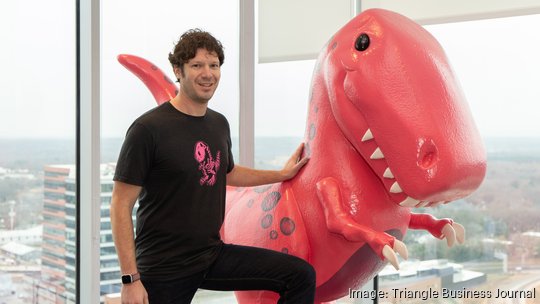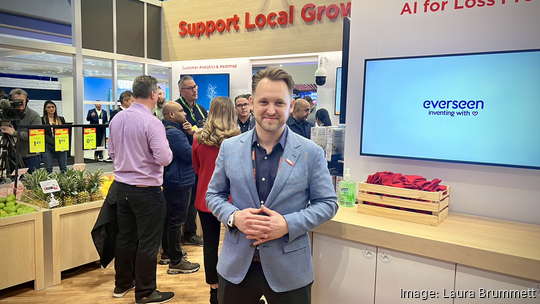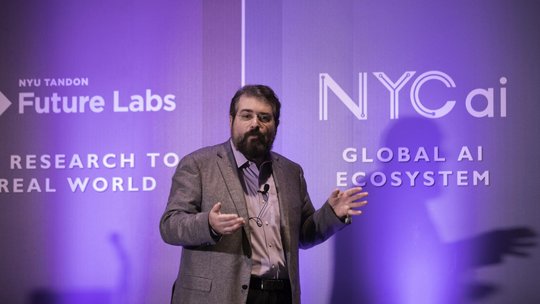
Wednesday's announcement was two and a half years in the making: The introduction of Pendo AI.
Todd Olson, CEO of Pendo, headquartered in Downtown Raleigh, said the company has been working to capitalize on the interest in artificial intelligence – both for its customers and its own bottom line.
“We’ve actually challenged every team at Pendo … on how they can leverage AI to improve their product areas,” he said. That includes leveraging technologies from companies such as Google (Nasdaq: GOOG) and OpenAI.
While there’s been widespread chatter about AI replacing human labor, Olson – and other Triangle technologists – say the opportunity for job creation is greater and that the Triangle could be uniquely positioned to benefit.
“With any technology revolution … there’s always been a little bit of fear from society that hey, this new innovation is going to ultimately eliminate roles … but history has shown repeatedly that that’s not the case,” Olson said, adding that innovation typically creates jobs and opportunity. “The challenge for us as an industry sometimes is, we don’t know what those jobs and opportunities are yet until we start implementing the technology.”
Triangle Inno checked in with other technology firms – and they too see opportunity. But there are challenges ahead when it comes to attracting additional AI players to the region.
What big players are doing
At global technology firm Lenovo, the Triangle is the center of its efforts in AI, said Robert Daigle, the company's Raleigh-based global AI business leader. Daigle joined the computer manufacturer in 2017 as part of an expansion that coincided with a $1.2 billion investment into innovative technologies. Over the years, Lenovo has doubled down on its AI investment. Last month, the company announced it had reached annual AI infrastructure revenue of more than $2 billion. And that it would funnel in an additional $1 billion over the next three years to accelerate its AI deployment. $100 million of the sum would be earmarked to grow its AI Innovators program, which had already delivered more than 150 AI solutions.
The Triangle, where Daigle runs a team of about a dozen AI-focused technologists, is the center of the effort.
“This is where we lead a lot of our AI projects that we work on for customers,” he said. “Most of that activity runs right out of our lab here in Morrisville.”

The new investment could mean more employees and more technologies coming out of that lab – as the plan is to expand its AI solutions into new verticals.
Daigle said similar investments by other players in the Triangle are good for Lenovo – as they increase the talent pool, as well as partnership opportunities.
“They say a rising tide lifts all boats,” he said. “As we have more and more organizations coming into the Triangle to expand these highly technical, sought after skillsets like artificial intelligence, it’s going to bring more and more opportunity to the Triangle … and it lifts the overall talent pool.”
Legacy players like IBM (NYSE: IBM) and SAS Institute in Cary have announced sizable AI investments over the years. In May, SAS disclosed its own $1 billion investment to further develop advance analytics solutions.
Startups challenge legacy players
But newer players are threatening the long-held dominance of legacy firms in the space. That includes startups such as Pendo, but it also includes firm that have been solely focused on AI.
Igor Jablokov, CEO of Raleigh-based Pryon, sold his last startup, Yap, to Amazon (Nasdaq: AMZN). The technology led to Amazon’s Alexa.
Jablokov said there are major opportunities for forward thinking tech firms – Pryon is developing an enterprise AI platform. OpenAI’s mainstream success helped people understand the message he’s been delivering about Pryon since it was founded in 2017, he said.
“Obviously the entire space has been heating up like gangbusters if you will,” Jablokov said. And success has meant growth for companies like his.

Pryon wants to get its headcount to 100 this year, and that means “hiring like crazy,” including attracting talent from legacy players.
“We’ll end up being the largest AI company in the Southeast,” Jablokov said.
However, he said the space is so hot that there are players just trying to ride its coat tails.
“What you’re going to see is the understanding that purpose-built platforms that always targeted enterprise scenarios are going to be safer. ... Pryon was always purpose-built.”
Jablokov said there are factors working against the Triangle’s success in the space – the biggest one is a lack of venture capital. He said the pandemic showed Silicon Valley investors they can remotely make investments outside of Sandhill Road. He sees opportunities for North Carolina to put together targeted incentives packages, similar to the support offered by Startup New York.
“How are you going to move folks from tax free states like Florida and Texas to try to relocate to North Carolina?” he said. “You’re not going to.”
But he said the factors working in favor of the emerging cluster are already numerous – including the presence of major research universities pumping out more talent and the tech and life sciences companies already here.